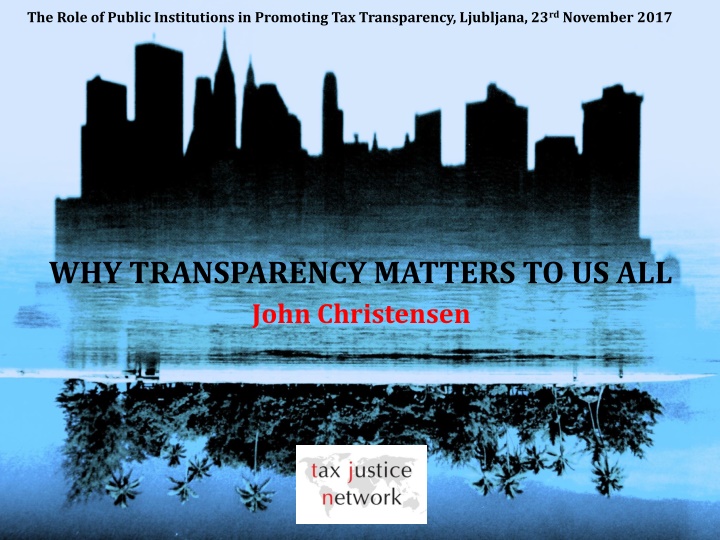
Tax Transparency and Offshore Practices
Delve into the importance of tax transparency, the role of public institutions, and offshore practices as highlighted by John Christensen and TJN. Explore the complexities of offshore transactions and their implications on global financial systems.
Download Presentation

Please find below an Image/Link to download the presentation.
The content on the website is provided AS IS for your information and personal use only. It may not be sold, licensed, or shared on other websites without obtaining consent from the author. If you encounter any issues during the download, it is possible that the publisher has removed the file from their server.
You are allowed to download the files provided on this website for personal or commercial use, subject to the condition that they are used lawfully. All files are the property of their respective owners.
The content on the website is provided AS IS for your information and personal use only. It may not be sold, licensed, or shared on other websites without obtaining consent from the author.
E N D
Presentation Transcript
The Role of Public Institutions in Promoting Tax Transparency, Ljubljana, 23rd November 2017 WHY TRANSPARENCY MATTERS TO US ALL John Christensen
TJN has done more than any other organisation to put fiscal justice at the centre of the policy agenda. Tax issues should not be left to those who want to escape taxes! Changes will come when more and more citizens of the world take ownership of these matters. TJN is a powerful force acting in this direction. A global network of researchers and practising professionals working with advocacy and campaigning professionals to remedy financial market failures, promote just tax policies and tackle the harm caused by tax havens. Thomas Piketty Launched in March 2003, the network spans over 80 countries on 6 continents. Author, Capital in the Twenty-First Century www.taxjustice.net
Offshore Offshore is not a physical geographic phenomenon. Offshore refers to the practice of recording a transaction in a different country to where the transaction actually takes place.
The tax termites shifting profits
Client is a Jersey-based offshore subsidiary of an upstream oil production joint venture operated by a global supermajor oil company in the Niger Delta region Crustacea Nigeria Well XX Limited Step 1: Monthly invoice issued for unspecified engineering consulting services Step 2: Payment made to offshore bank account held in Saint Helier, Jersey Crustacea (Jersey) Limited Step 3: Payment made to Swiss bank account in name of The Crustacea Trust (Bermuda) Crustacea Trust (Bermuda) Step 4: Funds distributed via Cayman bank accounts held by a variety of BVI registered shell companies Crab (BVI) Lobster (BVI) Shrimp (BVI)
Net losses from illicit outflows between 1970 to 2008 from 33 sub-Saharan countries totalled $944 billion. Combined external debts for those countries at end-2008 was $177 billion. Almost all these flows went via secrecy jurisdictions linked to OECD countries, with UK dependencies playing a prominent role
www.taxjustice.net @jechristensen56










